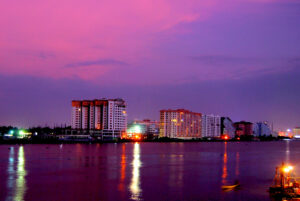Kochi’s Marine Exports: How Tech Is Boosting the Industry

Kochi, often celebrated as the Queen of the Arabian Sea, has long been a linchpin of India’s marine export sector. In 2025, the city’s marine industry is experiencing a seismic shift, driven by cutting-edge technology, innovative startups in Kochi, and robust government support. As a result, Kochi’s marine exports are not only more efficient and sustainable but also better positioned to meet the ever-growing demands of global markets.
From Harbor to Home: Kochi’s Export Infrastructure
First and foremost, Kochi’s strategic location and world-class infrastructure underpin its success as a marine export hub. The Cochin Port Trust and the Vallarpadam International Container Transshipment Terminal (ICTT) facilitate swift loading and unloading of seafood consignments. In addition, the Seafood Park at Aroor provides state-of-the-art processing, packaging, and cold storage facilities.
Consequently, these integrated logistics solutions have shortened lead times, reduced spoilage, and enabled exporters to serve markets in the USA, EU, Japan, and the Middle East with unparalleled reliability.
Automation and AI: Revolutionizing Seafood Processing
Moreover, the demand for high-quality, contaminant-free seafood has driven Kochi’s processors to adopt automation and artificial intelligence. Modern processing plants employ robotic systems for de-heading, peeling, and grading. Simultaneously, AI-powered quality control platforms detect imperfections and ensure each batch meets stringent hygiene standards.
By automating repetitive tasks, processors can scale up output without compromising on quality. Consequently, seafood exports from Kerala are commanding premium prices on the world stage.
Blockchain and Traceability: Building Consumer Trust
Furthermore, global consumers increasingly demand transparency in their food supply. To address this, many exporters in Kochi have integrated blockchain technology into their supply chains. Each batch of shrimp, tuna, or cuttlefish is tagged with a QR code that, when scanned, reveals its entire journey—from the fishing vessel to the retail shelf.
This level of traceability not only instills consumer confidence but also streamlines regulatory compliance. Indeed, by showcasing provenance, Kochi’s marine exporters can differentiate themselves against competitors and secure long-term contracts.
Smart Cold Chains: Preserving Freshness
In addition to traceability, maintaining an unbroken cold chain is critical for seafood quality. Kochi’s cold storage facilities and refrigerated transport vehicles now utilize IoT sensors and cloud-based monitoring. These systems relay real-time data on temperature and humidity, triggering alerts if conditions deviate from optimal ranges.
As a result, exporters dramatically cut down on spoilage and waste. Consequently, the marine industry in Kochi has witnessed significant cost savings, bolstering overall profitability.
Startups Driving Innovation
A pivotal force in this transformation has been the rise of marine startups in Kochi. Supported by the Kerala Startup Mission (KSUM) and regional Maritime Innovation Hubs, entrepreneurs are tackling age-old challenges with fresh perspectives:
-
AquaSense Technologies uses machine learning to predict catch yields and optimize fishing routes.
-
TraceSea Solutions specializes in blockchain-based traceability platforms.
-
SmartFrost Labs develops advanced refrigeration modules that reduce energy consumption by up to 30%.
Such innovations are not only enhancing operational efficiency but also creating new business models—ranging from direct-to-consumer online seafood marketplaces to subscription-based freshness guarantees.
Sustainable Aquaculture: The Next Frontier
Consequently, sustainability has become a mantra for Kochi’s marine sector. Recirculating Aquaculture Systems (RAS) and biofloc technology are being increasingly adopted by shrimp and fish farmers. By recycling water and harnessing beneficial microbial communities, these methods minimize environmental impact and reduce freshwater usage.
Furthermore, government incentives from the Marine Products Export Development Authority (MPEDA)—including subsidies on RAS installations and grants for eco-certified farms—are accelerating this shift toward sustainable aquaculture in Kerala.
Industry Collaboration and Research
In parallel, academic institutions like the Central Institute of Fisheries Technology (CIFT) and Cochin University of Science and Technology are collaborating with exporters to refine processing techniques and develop new value-added products. These partnerships focus on:
-
Biotechnological advances in fish health and breeding.
-
Novel packaging materials that extend shelf life without chemicals.
-
Renewable energy integration for processing units.
Through such synergies, Kochi is solidifying its reputation as a center for marine R&D, attracting both domestic and international investment.
Economic Impact and Global Competitiveness
Taken together, these technological interventions have translated into impressive economic gains. In 2024–25, MPEDA reported that Kerala’s seafood exports exceeded ₹9,000 crore, with Kochi accounting for a major share. As the industry embraces smart logistics, blockchain, and automation, Kochi is increasingly able to rival top exporters like Thailand and Vietnam.
Moreover, the city’s focus on sustainability and traceability aligns perfectly with the stringent standards of European and North American markets, thereby unlocking premium segments and fostering long-term growth.
Looking Ahead: Kochi’s Marine Export Vision for 2030
In summary, Kochi’s marine export sector in 2025 stands at the cusp of a new era—one defined by technology, transparency, and sustainability. With continued support from government bodies, academic collaborations, and a vibrant startup ecosystem, Kochi is poised to further elevate its status as a global seafood powerhouse.
By 2030, the vision is clear: smarter processing, green aquaculture, and seamless digital supply chains will be the norm. As technology continues to reshape every link of the value chain, Kochi’s marine exports will not only grow in volume but also in value—securing the city’s place at the forefront of the international seafood market.
0 Comments